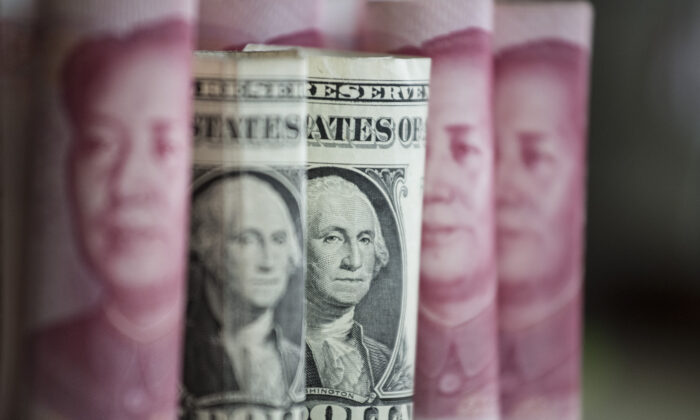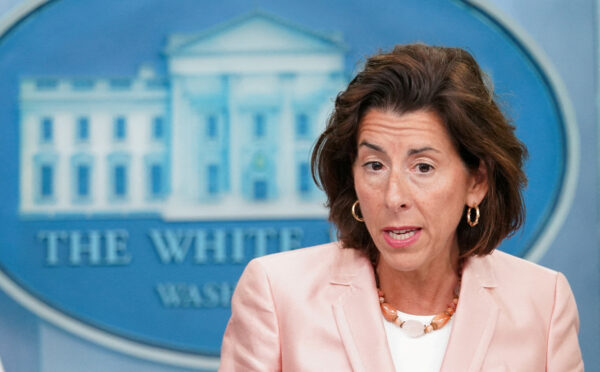By Andrew Moran
March 3, 2023Updated: March 3, 2023
Chinese 100 yuan notes
and one US dollar notes in Beijing on Jan. 6, 2017. (Fred Dufour/AFP via Getty
Images)
A billionaire investor is
urging caution about investing in China, warning that he has been prevented
from accessing his money because of Beijing’s strict capital controls.
According to Mark Mobius,
the founder of Mobius Capital Partners, the Chinese government has taken “very
significant” action to prevent him from withdrawing capital from Chinese
equities since his HSBC account is situated in Shanghai.
“I can’t get an
explanation of why they’re doing this. It’s just amazing. They’re putting all
kinds of barriers,” Mobius told the Fox Business Network on Thursday.
“They don’t say, ‘No, you can’t get your money out,’ but they say, ‘Give us all
the records from 20 years of how you’ve made this money,’ and so forth. It’s
crazy.”
The U.S. investor thinks
the economic landscape has adopted “a completely different direction” from the
previous market-oriented leader Deng Xiaoping, explaining that it is not a good
sign for the country’s future if the central government becomes “more
control-oriented in the economy.”
“I can’t get my money
out. The government is restricting the flow of money out of the country,” he
said. “So, I would be very, very careful investing in China.”
As a result of what is
transpiring in the world’s second-largest economy, Mobius believes the best
investment alternatives with tremendous economic opportunity are India and
Brazil.
The Biden administration
recently confirmed that it intends to inspect U.S. capital flows to China
closely. The White House and Congress are exploring proposals to monitor and
prohibit U.S. investments in China to address national security concerns.
The House Select
Committee on the Chinese Communist Party, chaired by Rep. Mike Gallagher
(R-Wis.), plans to scrutinize export controls and
outbound investment issues as part of reviews of U.S. competition with China.
Commerce Secretary Gina
Raimondo warned that these efforts must strike a balance between strategic and
facilitating investments since many domestic pension funds invest clients’
money in the country.
“You certainly don’t want
to do any type of thing that has an unintended consequence, that hurts folks.
You don’t want to be overly broad. We want commerce, we want trade, we want
global investment. Anything that’s overly broad hurts American workers and the
economy,” Raimondo said in an interview with Bloomberg.
While it is a top
priority for the administration, it is crucial to take it slow and “get it
right” rather than denying money flows, she stated.
“And so, we’re just
trying to be cautious to get it right,” Raimondo added.
Capital
Flight
In the fourth quarter of
2022, China posted its first net outflow of funds in more than two years,
driven by declines in foreign investments and exports.
According to recent data
from the State Administration of Foreign Exchange (SAFE), China witnessed a net
$11.2 billion leaving the country in the October-to-December period, which was
the biggest capital outflow since the third quarter of 2019.
New Bloomberg calculations using China Central Depository &
Clearing Co. and Shanghai Clearing House data suggest that overseas funds
resuscitated the selling behavior of Chinese bonds in January. To kick off
2023, foreign holdings of Chinese onshore bonds tumbled by more than 3 percent
to a three-year low of $470 billion.
Outflows have increased
over the past year as central banks tightened monetary policy, offering more
attractive yields.
While the rest of the
world has been raising interest rates and reducing balance sheets, China has
been employing loosening measures. Last summer, the People’s Bank of China
(PBoC) lowered its one- and five-year loan prime rates (LPRs) to 3.65 percent
and 4.3 percent, respectively. In November, the central bank also trimmed
the reserve requirement ratio for most financial institutions by 25 basis
points to below 8 percent.
As a result of officials
easing policy, China’s 10-year bond yield is roughly 2.94 percent, compared to
the benchmark U.S. 10-year Treasury yield of about 4 percent.
As part of efforts to
bolster economic conditions, Zhong Zhengsheng, chief economist at Ping An
Securities Co., told Bloomberg last month that the central
bank could cut interest rates in the second quarter to accelerate the recovery.
Meanwhile, for the first
time in 25 years, the American Chamber of Commerce in China’s “2023 China
Business Climate Survey Report” revealed that China is no longer a primary
investment destination for most U.S. businesses. The study, which was conducted
this past fall, discovered that the number of U.S. firms starting to or
thinking about relocating their sourcing outside of China rose 10 percent from
a year ago.
“After three full years
dominated by the COVID-19 pandemic, members expressed concern about their
companies’ financial performance and expectations regarding China’s openness
and business climate, contributing to a slightly more pessimistic outlook
compared to previous years,” the report stated.
Economists purport that
the timing of the start of outflows also coincided with Russia’s invasion of
Ukraine.
“Outflows from China on
the scale and intensity we are seeing are unprecedented, especially since we
are not seeing similar outflows from the rest of emerging markets,” Institute
of International Finance (IIF) chief economist Robin Brooks wrote in a March
2022 report. “The timing of outflows—which built after Russia’s invasion of Ukraine—suggests
foreign investors may be looking at China in a new light, though it is
premature to draw any definitive conclusions in this regard.”
Still, Chinese
policymakers are betting big on the nation’s post-pandemic economic
reopening—and so are foreign investors. In January, foreign direct investment
into China steadily rose, climbing 10 percent year-over-year. SAFE
Deputy Administrator and Press Spokesperson Wang Chunying asserted
in a statement that its economic development prospects and vast
consumer market are appealing to foreign investors.
“For 2023, investors
agree that growth will recover after the removal of zero-Covid policy, although
there are disagreements on the strength of the recovery, with consumer
confidence, property market, and local government debt being the top concerns,”
said Goldman Sachs’ chief China economist Hui Shan in a note.


No comments:
Post a Comment